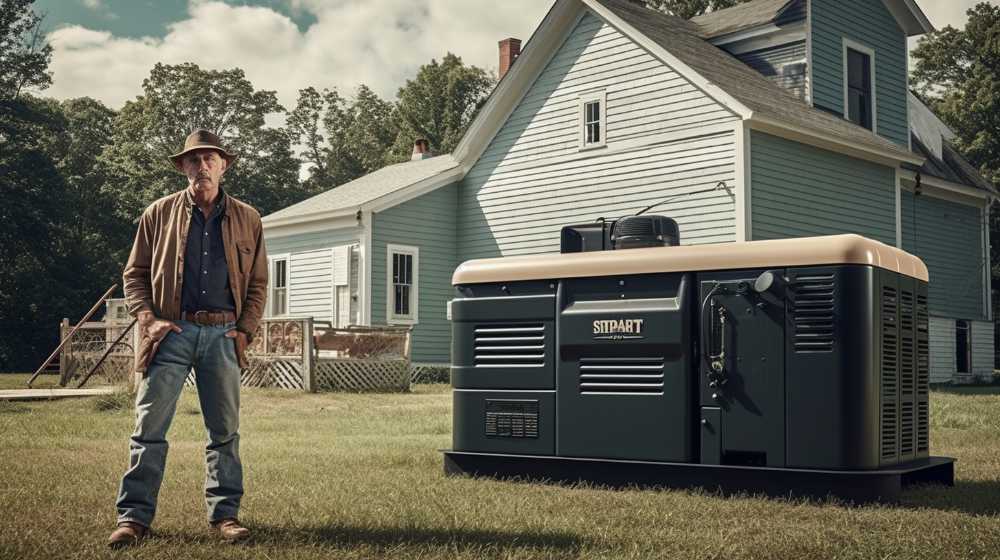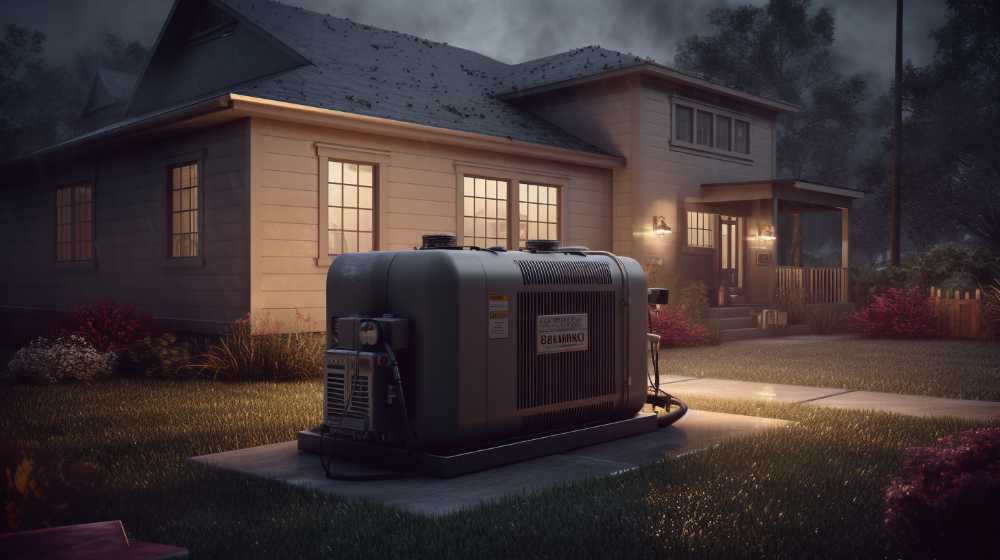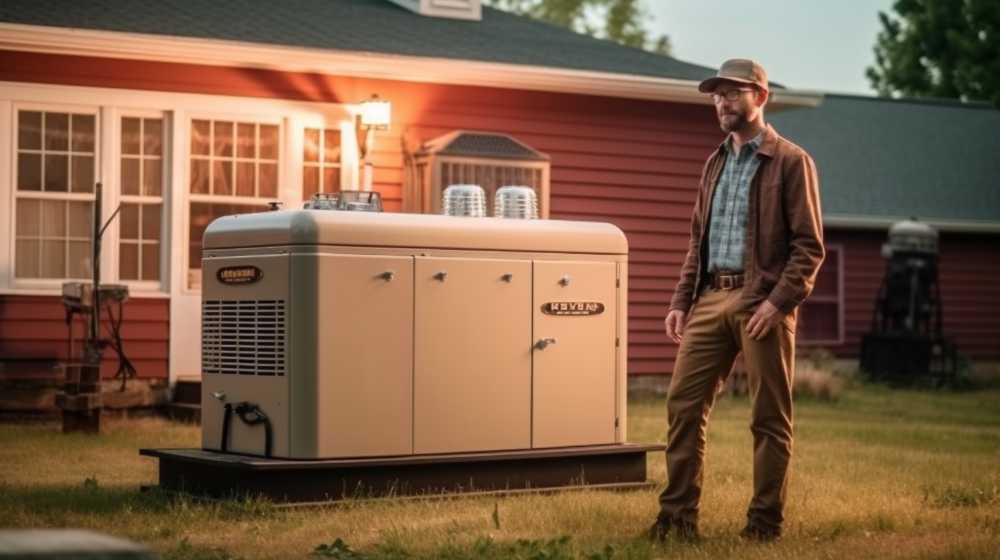Last Updated on May 25, 2023 by Rod Olivares

Imagine what would occur if the electricity were to go out. The heating and cooling system in your house will be inoperable. The basement sump pump won’t turn on. These can all be dangerous for you and your home – and increase your likelihood of submitting a home insurance claim. Therefore, it is no surprise that insurance firms give discounted rates to homeowners that make further steps to eliminate house risks. But does installing generators count for these discounts?
If you have a generator, many insurance companies will reduce the cost of your homeowner’s insurance by 5-10%. A propane or natural gas-powered automated standby generator is often required. Homeowner’s insurance rate and requirements may also vary between insurance companies.
We’ve talked about how having a whole house generator can yield a tax credit, now let’s look at any possible savings or coverage choices related to installation of standby generators and how they may affect your insurance policy rate positively. Continue reading to learn more.
Does Homeowners Insurance Cover Generators?
Just like any other component of your home, whole house generators are susceptible to failure or damage from a natural catastrophe, leaving you without power and perhaps out of pocket. Your insurance provider may reimburse you for the loss of your generator in these certain circumstances.
For example, your homeowners premium would cover the cost of the automatic standby generator if installed in the garage, and the garage catches fire, destroying the generator. The same is for other cases, such as a tornado, hurricane, natural catastrophe, or if your generator gets hit by lightning.
However, there are some exceptions. Your insurance provider will likely only pay for a new whole house generator but not if your older generator malfunctions due to normal wear and tear or improper maintenance.
Discussing what your homeowners policy covers and does not cover concerning generators with the best home insurance company you may find is vital.

The Impact Of Generators on Homeowners Insurance
Many homeowners need to know that installing whole house generators qualifies them for a homeowners discount. How can a standby generator reduce homeowners insurance?
For example, in a power outage, your house will lose heat, and pipes might freeze. You may sustain damage to your walls, ceilings, carpets, and other surfaces when frozen pipes break. These problems will probably not arise if you have a complete home generator.
Making your house safer is one of the most excellent methods to reduce the cost of your home insurance. Employing smoke detectors, a home security system or a backup generator may assist you in making your home stormproof.
As a result, insurance companies often offer you a discount if you have a generator installed. It aids in lowering any claims you could submit due to mishaps and disasters. This policy is referred to as a loss mitigation credit by certain insurance firms.
What is a loss mitigation credit?
The phrase “loss mitigation credit” is often used in the insurance sector, particularly concerning home insurance. It alludes to a reduction or credit in the insurance premium imposed due to taking actions to lower the likelihood of property loss or damage.
Insurance companies often provide loss mitigation credits to encourage customers to take proactive measures to reduce possible risks. Policyholders may show their dedication to decreasing the possibility of claims by taking specific risk-reduction steps, which may decrease the price of their insurance coverage.
Here are a few examples of how it may function for you.
You set up a backup generator. If a rainstorm knocks out the electricity, you may use the generator to power your basement sump pumps. By doing this, you may prevent a water backup in your house. It reduces financial losses brought on by water backup-related damage when losing power.
After setting up backup generators, a storm knocks out the electricity for hours. Most of the time, having no electricity forces you to throw away the food in the refrigerator or freezer. The generator aids in preventing this loss.
What Type of Generator Do Insurance Companies Require?

Many insurance companies will reduce your home’s insurance cost by roughly 5-10% if you install an autonomous backup generator (not a portable generator).
You will need to purchase automatic standby generators to qualify for the rebate. When a power loss is detected, such units, natural gas generators or propane-powered, automatically switch on compared to inverter generators.
To qualify for the rebate, the generator may need to be permanently installed in your house. This implies that you would not be qualified for the discount if you possess portable generators that you also use for outside activities like camping or sporting events.
It is best to go through the possible discounts and options with your house insurance provider. Some home insurance company people will suggest the best brands of generators to power your home. Others will demand that you only set up the generator outside.
Discuss the hazards with your insurance agent. Find out whether using a generator qualifies you for a discount on your house insurance.
Steps to Maximize Insurance Savings With A Generator
You want to secure your house, but you also don’t want to spend more money than you have to. Follow these tips to maximize your insurance savings with a generator.
Consultation With Insurance Providers
How a generator could affect insurance costs is a crucial consideration when installing one, as well as considering all of the benefits that come with having one. Homeowners may optimize their insurance savings by speaking with a trusted insurance provider.
Start by looking into insurance companies that give coverage choices or savings exclusively for generators. Choose reputed insurers with knowledge of covering houses with a backup electrical system. Consider things like consumer feedback, rules, and their awareness of generator hazards.
Ask the consultant if there are any particular generator coverage choices available. Some insurance companies provide riders or endorsements that extend coverage to generators, protecting against risks, including mechanical failure, damage during installation, and fuel loss. Explore these choices to make sure you have sufficient insurance.
Certain insurance companies grant discounts for generator safety measures, such as automated shut-off mechanisms, surge protection, or properly built transfer switches.
Review your insurance limits and deductibles to ensure they correspond with the higher value of your property as a result of the generator installation. Adjustments could cover the extra value and related risks appropriately. Although it may not directly impact insurance rate, doing this guarantees you enough coverage in the event of a claim.
Required Documentation and Information for Insurance Evaluation
In addition to gaining peace of mind during a power outage, homeowners who install generators may be eligible for insurance reductions. It’s crucial to provide the required documents and information to insurance carriers during the review process to optimize these discounts.
Proof of Generator Ownership and Installation: Homeowners must produce documentation of generator ownership and installation to verify their eligibility for insurance savings. This proof often contains supporting documents, such as invoices for purchases or installations, or licenses received from local authorities. These records attest to the house generator installed.
Specifications and Safety Characteristics of the Generator: Insurance companies are curious about the details and safety characteristics of the installed generator. Thanks to this information, they can evaluate the system’s risk reduction and dependability capacity. Prepare information about the generator’s fuel supply, capacity, automatic shut-off mechanisms, surge protection, and any other safety measures that improve its performance and reduce mishaps or damage.
Maintenance and Service Records: Maintenance and service records are necessary for the generator to operate at its best and last as long as possible. Insurance companies could request documents or proof that the generator has consistently undergone expert maintenance and repair. Maintain a record of the generator’s service logs, maintenance invoices, and warranty details.
Certification and Compliance: Some insurance companies may demand documentation of the generator installation’s certification or adherence to relevant industry standards. This certification may include accreditation from groups like the National Fire Protection Association (NFPA) or adherence to regional construction laws and rules. Ensure you have the appropriate records to prove the generator installation complies with all relevant safety requirements.
Home Security Measures: It may be advantageous to emphasize the security precautions to safeguard the generator and your property. Insurance companies often value extra security precautions that reduce the possibility of theft or damage. Describe the security measures to secure the generator and your houses, such as locks, fences, security cameras, and alarm systems.
Backup Power Reliability: Stress the capacity and dependability of the generator to provide backup power during power interruptions. Insurance carriers value backup power systems that sustain vital services because they lower the chance of damage or losses. Prepare to talk about the length of time the generator can provide power, the particular systems or appliances it serves, and any steps taken to guarantee a smooth transition during power outages.
Homeowner Association (HOA) Approval: Approval from the Homeowner Association (HOA): If you reside in a neighborhood under an HOA’s control, be sure you have gotten all essential approvals or permits for the generator installation. Certain insurance companies may require documentation proving adherence to HOA rules and regulations.
Comparing Insurance Quotes To Find The Best Coverage Options
The Insurance Information Institute lists acquiring a home security system and improving your house’s storm resistance as two of the most effective ways to lower your homeowner’s insurance premium.
Many insurers provide policyholders a “loss mitigation credit” to lower the number of insurance claims they submit after a catastrophe. A homeowner may lower their insurance premiums by making a good investment to prevent losses and eventual insurance claims.
The insurance industry often views an automatic standby generator as a theft deterrent. Because autonomous standby generators keep the house occupied and eventually deter theft when the power goes out, insurance companies may provide policy premium savings to homeowners whose property has one.
On the other hand, whole home generators also increase your property’s value and decrease your homeowner’s insurance premium. Homeowners should expect a 3 to 5 percent increase in property value after installing a whole-house generator.
For homeowners who want to sell their houses, this implies a significant return on investment.
A whole-house generator is an excellent option if you want to make a long-term investment. Before investing in a backup power solution like an autonomous standby generator, explore possible savings with your insurance company or provider.
Other Ways To Reduce Homeowners Insurance
Aside from installing a home backup generator, there are other ways to reduce homeowners insurance potentially.
Security Systems: Installing a burglar alarm or a more advanced home security system connected to an external monitoring system may reduce your home insurance cost. Some insurers may want an “alarm certificate” to prove that your system interacts with the neighborhood police or a private security firm. If you have a home security system, you will reduce your insurance rate by 2 to 3 percent.
New Roof: A “roof age” discount may apply when replacing your roof in 20 states where hail is a problem. Some insurers may lower rates for clients who live in locations vulnerable to hurricanes, tornadoes, or wildfires, for instance, if they buy a “fortified” roof composed of more rigid materials. Customers who completely replace their roofs with reinforced versions have experienced premium cuts from their insurance ranging from 5 percent to 15 percent or more. When insurers grant discounts for new roofing, they can only do so for certain goods made by specific companies.
Detectors and Sensors: Adding smoke detectors or sensor systems that identify gas leaks or drastic temperature fluctuations may lower your insurance costs depending on where you reside. Some insurers may provide a 3 to 5 percent discount for devices that identify gas leaks or drastic temperature swings.
Conclusion
Every homeowner should consider a whole-house generator when listing necessary household items. Depending on various factors, your homeowners’ insurance company may reward you with a rate cut if you try to make your house safer by installing a generator.
There are also several other strategies to lower the cost of your home insurance. Shop around for home insurance providers to be sure you’re receiving the best deal.
Taking proactive measures and looking for the right options can help you make informed decisions, potentially leading to insurance savings and improved coverage for your home.

Scott Krager purchased generatorgrid.com in the summer of 2020 and quickly began to buy every generator under the sun! He currently has over a dozen generators and the number is growing quickly. He lives in Portland, OR near his family and friends.
GeneratorGrid.com is an independent review business. I am not affiliated with any manufacturers and do not accept paid reviews. When you buy through my links, I may earn a commission which helps me purchase more generators for testing. - Scott Krager

